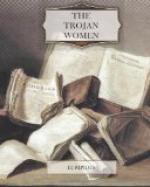[Antistrophe.
O, swift were all in Troy that day,
And girt them to the portal-way,
Marvelling at that mountain Thing
Smooth-carven, where the Argives lay,
And wrath, and Ilion’s vanquishing:
Meet gift for her that spareth not[29],
Heaven’s yokeless Rider. Up they brought
Through the steep gates her offering:
Like some dark ship that climbs the shore
On straining cables, up, where stood
Her marble throne, her hallowed floor,
Who lusted for her people’s blood.
A very weariness of joy
Fell with the evening over Troy:
And lutes of Afric mingled there
With Phrygian songs: and many a maiden,
With white feet glancing light as air,
Made happy music through the gloom:
And fires on many an inward room
All night broad-flashing, flung their glare
On laughing eyes and slumber-laden.
A MAIDEN.
I was among the dancers there
To Artemis[30], and glorying sang
Her of the Hills, the Maid most fair,
Daughter of Zeus: and, lo, there
rang
A shout out of the dark, and fell
Deathlike from street to street, and made
A silence in the citadel:
And a child cried, as if afraid,
And hid him in his mother’s veil.
Then stalked the Slayer from his den,
The hand of Pallas served her well!
O blood, blood of Troy was deep
About the streets and altars then:
And in the wedded rooms of sleep,
Lo, the desolate dark alone,
And headless things, men stumbled on.
And forth, lo, the women go,
The crown of War, the crown of Woe,
To bear the children of the foe
And weep, weep, for Ilion!
* * * * *
[As the song ceases a chariot is seen approaching from the town, laden with spoils. On it sits a mourning Woman with a child in her arms.
LEADER.
Lo, yonder on the heaped crest
Of a Greek wain, Andromache[31],
As one that o’er an unknown sea
Tosseth; and on her wave-borne breast
Her loved one clingeth, Hector’s child,
Astyanax.... O most forlorn
Of women, whither go’st thou, borne
’Mid Hector’s bronzen arms, and piled
Spoils of the dead, and pageantry
Of them that hunted Ilion down?
Aye, richly thy new lord shall crown
The mountain shrines of Thessaly!
ANDROMACHE
[Strophe
I.
Forth to the Greek I go,
Driven as a beast is driven.
HEC. Woe, woe!
AND. Nay, mine is woe:
Woe
to none other given,
And
the song and the crown therefor!
HEC. O Zeus!
AND. He hates thee sore!
HEC. Children!
AND. No more, no more
To
aid thee: their strife is striven!
HECUBA.
[Antistrophe
I.




